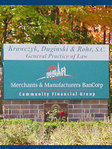Filter by
What a Real Estate Lawyer Can Do for You
A real estate lawyer provides legal assistance in transactions and disputes involving property, including residential and commercial real estate. Whether you're buying, selling, leasing, or developing property, a real estate attorney can help ensure that your transactions are legally sound and your rights are protected. They review contracts, perform due diligence, resolve disputes, and provide legal representation in negotiations and litigation involving property matters.
Real estate lawyers are crucial in safeguarding your investment by ensuring compliance with local, state, and federal real estate laws, as well as protecting you from potential legal pitfalls related to property ownership and transactions.
When Should I Hire a Real Estate Lawyer?
Hiring a real estate lawyer is beneficial in various scenarios, including:
- Buying or selling property: When navigating complex real estate contracts, it’s advisable to have a lawyer review and ensure that the terms are favorable and legal.
- Commercial property transactions: For leasing, purchasing, or selling commercial properties, a lawyer can help manage the intricate legal aspects of such transactions.
- Zoning or land use issues: If you're planning to develop property or change its use, a real estate lawyer can guide you through zoning laws and land use regulations.
- Resolving property disputes: For boundary disputes, title issues, or disagreements over property rights, a lawyer can help mediate or litigate the matter.
- Foreclosures or evictions: If you're dealing with foreclosure or managing a tenant eviction, legal representation ensures that the process adheres to local laws and protects your interests.
- Title and deed issues: Lawyers can help clear title disputes, ensure the legitimacy of property deeds, and handle transfers of ownership.
What Does a Real Estate Lawyer Do?
A real estate lawyer provides a range of services to help with property transactions and disputes, including:
- Contract drafting and review: Ensuring that purchase agreements, leases, and other contracts are legally binding, fair, and protect your interests.
- Title search and clearance: Conducting a thorough title search to ensure that the property has no legal claims or liens that could affect ownership.
- Facilitate closing: Managing the closing process in real estate transactions, including reviewing final documents and ensuring that everything is in order before the transfer of ownership.
- Resolve disputes: Handling legal disputes related to property ownership, boundaries, zoning, or tenants.
- Assist in financing: Reviewing loan agreements and mortgage documents to ensure the terms are fair and legally sound.
- Zoning and land use advice: Guiding clients through the complexities of zoning laws and building regulations for property development or renovation projects.
How Are Real Estate Lawyers Paid?
Real estate lawyers typically charge for their services in the following ways:
- Flat fee: Many real estate transactions, such as reviewing a sales contract or assisting with a closing, are charged on a flat-fee basis.
- Hourly rates: If a lawyer is handling complex disputes or litigation, they may charge by the hour. Hourly rates can vary significantly based on the lawyer’s experience and location.
- Contingency fees: In rare cases, such as property disputes or claims for damages, a lawyer may work on a contingency fee basis, meaning they only get paid if you win or settle the case.
- Retainer: For ongoing legal support, some clients may pay a retainer, which is an upfront fee used as a deposit for future legal services.
It's important to clarify the fee structure with your attorney before hiring them to avoid any surprises.
How Much Does a Real Estate Lawyer Cost?
The cost of a real estate lawyer varies based on the complexity of the matter, the location of the property, and the lawyer’s experience. Key factors that affect pricing include:
- Type of transaction or issue: Simple tasks, like contract reviews, typically cost less than handling a complex property dispute or litigation.
- Experience and location: More experienced lawyers or those in high-demand areas, like urban centers, often charge higher rates.
- Billing structure: Lawyers may charge a flat fee for basic services like document review or hourly for more time-intensive work such as disputes or litigation.
Flat fees for straightforward services like closing assistance may range from $500 to $1,500.
Hourly rates can range from $150 to $400 or more, depending on the attorney’s experience and location.
Always discuss fees upfront to understand the overall cost of the legal service you're receiving.
Top Questions to Ask a Real Estate Lawyer
Before hiring a real estate lawyer, ask the following questions to ensure they are the right fit for your legal needs:
-
What experience do you have with real estate law?
Ensure the lawyer has experience in the type of real estate transaction or dispute you’re facing, whether residential, commercial, or development-related. -
What is your fee structure?
Ask how the lawyer charges for services - whether it's a flat fee, hourly rate, or retainer - so there are no surprises later on. -
How long will the process take?
Especially important for real estate transactions or disputes with deadlines, ask for a general estimate of how long the process will last. -
Have you handled cases similar to mine?
Experience with similar transactions or disputes can give you confidence that the lawyer knows how to handle your case. -
Will you handle my case personally, or will it be passed to another attorney?
Confirm who will be handling the bulk of your case work, especially in larger firms where junior lawyers may take on some responsibilities. -
Can you provide references?
Speaking with past clients can give you insight into the lawyer's experience and how they handle cases.
How to Check the Credibility of a Real Estate Lawyer
To ensure you’re hiring a reputable real estate lawyer, take these steps:
- Check with the state bar association: Verify that the lawyer is licensed and in good standing with no disciplinary actions on their record.
- Read online reviews and testimonials: Look for reviews on legal directories and platforms like Avvo or Martindale-Hubbell to see what past clients have said.
- Ask for references: A credible lawyer should have past clients willing to share their experiences.
- Review their track record and expertise: Look at the lawyer’s website or LinkedIn profile for information about their experience in real estate law and any relevant cases they’ve handled.
- Membership in professional organizations: Lawyers who are members of respected legal or real estate organizations, like the American Bar Association’s Real Property Division, often signal credibility and expertise.
What Should I Prepare for My First Consultation?
To make your first meeting with a real estate lawyer productive, you should prepare the following materials:
- Relevant property documents: Bring purchase agreements, lease contracts, mortgage documents, zoning permits, or any other paperwork related to your case.
- A summary of the issue or transaction: Be ready to explain the situation, whether it's a property dispute, contract negotiation, or development issue.
- Questions about the legal process: Prepare a list of questions about how the lawyer will handle your case and what steps are involved.
- Financial documents or loan agreements: If the case involves financing or a mortgage, bring any related documents for the lawyer to review.
- Your goals and timeline: Be clear about what outcome you're hoping for, and if there are any deadlines that need to be considered, such as closing dates or legal filings.
By coming prepared, you can ensure that your consultation is efficient and informative, allowing you to assess whether the lawyer is the right fit for your real estate needs.













